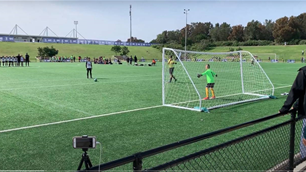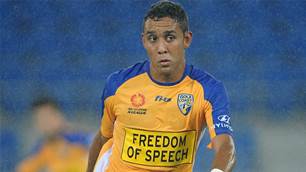THEY were once prisoners in their own country - now Gold Coast United's two new Eritrean refugee signings are within touching distance of achieving a lifelong dream.
Samuel Tesfagbr and Ambes Yosief, both 24, trained with their new teammates for the first time on Monday, completing the duo's remarkable transition from asylum seekers to professional footballers.
But the hard work starts now for the pair, who finished their duties with South Australian club Western Strikers a fortnight ago and are now desperate to play their first Hyundai A-League game to cap off their journey.
The road they've travelled to the Glitter Strip has been long, gruelling and incredibly dangerous - but it was all in the name of playing the game they love.
Tesfagbr and Yosief were among 11 members of the Eritrean national team who absconded during an international tournament in Kenya in December 2009.
Sport is one of the only ways to avoid mandatory military service in Eritrea and once athletes travel to another country under the guise of competition, many of them disappear.
It is an increasingly common tactic used by sportspeople to escape the nation's repressive regime - in July this year, another 13 players from Red Sea FC failed to return home from a regional competition in Tanzania.
To combat these defections, the Eritrean government charges athletes a four-figure fee as a deposit that is only returned if they do themselves.
Tesfagbr and Yosief knew if they were to ever realise their potential in football and progress their careers, they would have to leave their war-torn, poverty-stricken country.
But the Eritrean football federation simply refused to let them go.
"If you get an opportunity to go overseas and play football, they will not let you go," Yosief said.
The pair were very softly spoken and clearly still coming to terms with speaking to a free press, given their nation is rock bottom in terms of press freedom.
"We had contracts with some clubs in Europe, five-year contracts but the federation said no. That's why we left," Tesfagbr added.
"There are good players in Eritrea but unless something changes with the federation there will never be any proof."
From Kenya they sought asylum and spent nearly a year in a detention camp before they were resettled in South Australia, returning to play football at state-league level - the platform that paved the way for their deal with Gold Coast United.
"Life was hard," Tesfagbr said of their time in the refugee camp. "We couldn't play soccer and we had to stay in the one house. We couldn't go outside. It was strict.
"But football kept us going. It was our dream, to be professional players. Now we are here, it's really good."
Related Articles

Fresh talent flock to ambitious A-League outfit's pro pathway

Why A-League 20/21 is crucial for Olyroos’ medal hopes













